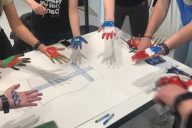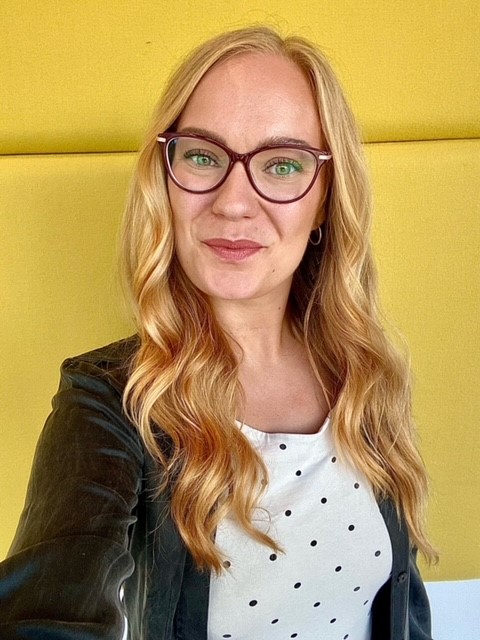Team members who trust one another can better communicate and coordinate behaviors, given their openness, familiarity, and reliability. (1)
Meaning of trust in multi- and interprofessional social and health care teamwork is essential, to understand and create a more balanced and emotional, sustainable working environment. In trusting the working environment, people feel safety (2). It increases satisfaction and involvement in work. There are two different approaches to trust from an individual’s point of view:
- Affective trustis based on interpersonal dynamics like co-identification and familiarity. It is also often emotional, such as offering feelings like becoming understood or believing in others’ goodwill. In contrast,
- Cognitive trust is based on people’s competence and predictability. (1). Both of them are needed to recognize and create a trusting working environment.
Especially in multi- and interprofessional teams this needs to be taken into account, because team members’ professional backgrounds and approaches can be different from each other. However, it is important to remember that trust is a very multilateral/multifaceted phenomenon, and it has been traditionally approached as a part of social capital (3, 4, 5). At work, its complicated and systematic nature is relevant to be recognized and remembered; even when approached from an individual point of view or as a skill.
Trust as a skill
Trust is often defined as a ‘phenomenon,’ ‘value,’ attitude’, or ‘emotion’, but in this text, we want to approach it as a ‘skill’ in a professional context. By that, we mean that it can be approached as a skill to improve trusting relationships between professionals, within professional networks and with a client/patient.
According to European Qualifications Framework, EQF (6), skills refer to the ability to apply knowledge and to use expertise to complete tasks and solve problems. In the context of EQF, skills are described as
- cognitive (e.g., involving the use of logical, intuitive, and creative thinking)
- or practical (e.g., involving manual dexterity and the use of methods, materials, tools, and instruments).
Trust – as a skill – can be located to soft skills or transversal skills. Transversal skills are transferable skills from one field to another. Transversal skills can be taught and learned (7). Trust can be seen to be part of interpersonal/social & emotional skills (Pedagogical Framework in ITSHEC project 2022).
Trust in everyday professional practice
Interaction and collaboration between people in small everyday practices can be very makeable for people. They can strengthen the feeling of respect, belonging and feeling of welcoming.
For instance, neuroscientist Paul Zak (8) has shown in his studies that “when someone shows you trust, a feel-good jolt of oxytocin surges through your brain and triggers you to reciprocate”.
According to that, there is a strong link between trust and overall health and psychosocial well-being (9). This is one of the reasons why trust should be approached also from a pedagogical point of view, as a skill.
Trust, as a skill, can express itself in the following ways in everyday practices as an ability to:
- open a dialogue
- keep timetables and promises (even with insignificant matters)
- behave predictably
- express goodwill to other
- outline shared goals, benefits, and risks
- set professional boundaries without losing kindness and caring attitude
- cooperate with others and to take account of various emotions in various contexts
- improve non-discriminatory atmosphere
- show interpersonal and social-emotional skills.
However, even if trust has often been approached as individual’s characteristics (or skills), attention needs also be paid to cultural trust propensity. In other words, it characterizes how willingly people trust each other in different cultures (10). Feeling of trust makes people happier with their lives (8). The skills of building trust are reflected in everyday interaction (11).
Changing working environments and trust
In global online work, employees evaluate reliability of a new person based on their speech, behavior, and perceived emotional state (12). For instance, ad hoc or project-specific organizations also need a climate of trust (swift trust). Then there is not so much time to build trust (13). In addition, virtual work can disturb quantity of interaction, but also the quality of engagement. Especially when a team is geographically dispersed, the number of modes of communication is limited. (1). Moreover, from supervisors’ point of view trust is traceable to reciprocity, open interaction, common goal and commitment, mutual respect, predictability, and security (14).
We need to pay more attention to understanding working conditions and different working environments behind trusting environments. Trust is not just a phenomenon, but it can also be seen as a transversal skill, which can be learned and developed. It demands from people awareness and willingness to self-reflection and open feedback. Trust and kindness are mutually flourishing and empowering. In a trusting relationship, the starting point is optimistic and hopeful, rather than always expecting the worst, suspecting, or fearing failures. In ITSHEC project, we will improve awareness of trust as a professional skill, as part of transversal skills. Lack of trust makes everyday life more difficult, unpredictable, and demanding. We need professional social and health care services to improve and strengthen people’s lives. Trustworthy professionals actualize a human-centered approach.
Authors
Eija Raatikainen (PhD) is a Principal lecturer in Metropolia University of Applied Sciences. Her academic focus is ”Trust” and “Empathy”, as phenomenon in different fields; like in Social Work, multiprofessional co-creation and project work, as well as educational practice and pedagogy. Additionally, she has a long track record as a project manager in various projects.
Katriina Rantala-Nenonen (M.Soc.Sc.) is a senior lecturer at Metropolia University of Applied Sciences. She teaches social sciences and works in national and international projects of social services and education. In ITSHEC project she works as a developing lecturer.
The article has been published earlier in Tikissä-blog of Metropolia University of Applied Sciences
References
- Dinh, J. V., Reyes, D.L., Kayga L., Lindgren C., Feitosa & Salas, E. (2021),Developing team trust: Leader insights for virtual settings, Organizational Dynamics, 50, (1).
- Edmondson, A.C. & Zhike, L. (2014), Psychological Safety: The History, Renaissance, and Future of an Interpersonal Construct.Annual Review of Organizational Psychology and Organizational Behavior. Vol. 1:23-43.
- Coleman, J. S. (1988), “Social Capital in the Creation of Human Capital”, American Journal of Sociology, Vol. 94, Supplement, pp. 95 – 130.
- Putnam, R.D. (1993), “Making Democracy Work. Civic Traditions in Modern Italy”, Princeton: Princeton University Press.
- Putnam, R.D. (2000), “Bowling Alone. The Collapse and Revival of American Community”, New York, Simon & Schuster.
- Framework and the Framework for Qualifications of the European Higher Education Area (2018), The Finnish National Agency for Education. The National Coordination Point for the European Qualifications Framework.
- Raatikainen, E. & Rantala-Nenonen, K. 2021. Transversaalit taidot ammatillisen kasvun jäsentäjänä. Teoksessa Jakonen, M., Houni, P., Mutanen, A., Halonen, I. & Aali, P. (2021). Työn järjestyksiä. YFI julkaisuja.11. Jyväskylän yliopisto.
- Zak, P.J. (2017), Trust Factor: The Science of Creating High-Performance Companies Hardcover – Illustrated, January 1, 2017 The Neuroscience of Trust (hbr.org)
- Martikainen P., Bartley M & Lahelma, E. (2002), Psychosocial determinants of health in social epidemiology, International Journal of Epidemiology, Volume 31, Issue 6, December 2002, Pages 1091–1093
- Mansour, J. & Zaheer, A. (2021), The Geography of Trust: Building Trust in Global Teams, Organizational Dynamics, Vo. 50, (2)
- Savolainen, T. (2016), Luottamus digijohtamisen voimavara ja taitohaaste.
- Blomqvist, K. (2018) Luottamus murroksessa. Työn tuuli-lehden julkaisu 2/2018 (PDF).
- Salmivaara, V., Martela, F. & Heikkilä, J.-P. (2020), Radikaali psykologinen turvallisuus tilapäisorganisaation luovan ja tuloksellisen toiminnan mahdollistajana.(39), 3,(2020): Hallinnon Tutkimus, 188-204.
- Raatikainen, E. (2021), Esimiesten näkemyksiä hyvästä työarjesta ja luottamuksellisesta työilmapiiristä, 34-50. Teoksessa Helminen, H, (toim) 2021. Nuoret ja työn merkitys. IT- ja sote alojen vastavalmistuneiden työhön sitoutuminen (tsr.fi).Haaga-Helian julkaisut 1/2021.





 Katriina Rantala-Nenonen
Katriina Rantala-Nenonen Hilla Niemi
Hilla Niemi Eveliina Korpela
Eveliina Korpela
Ei kommentteja